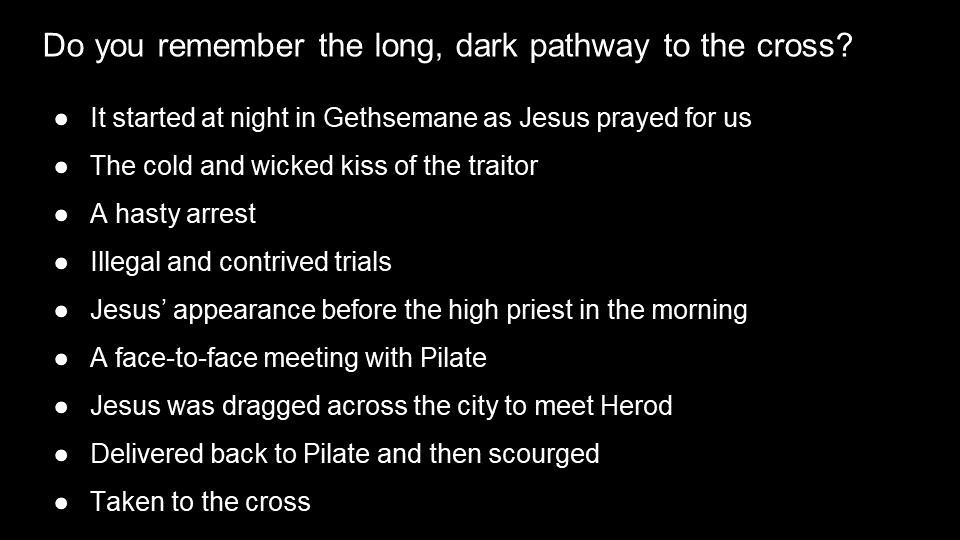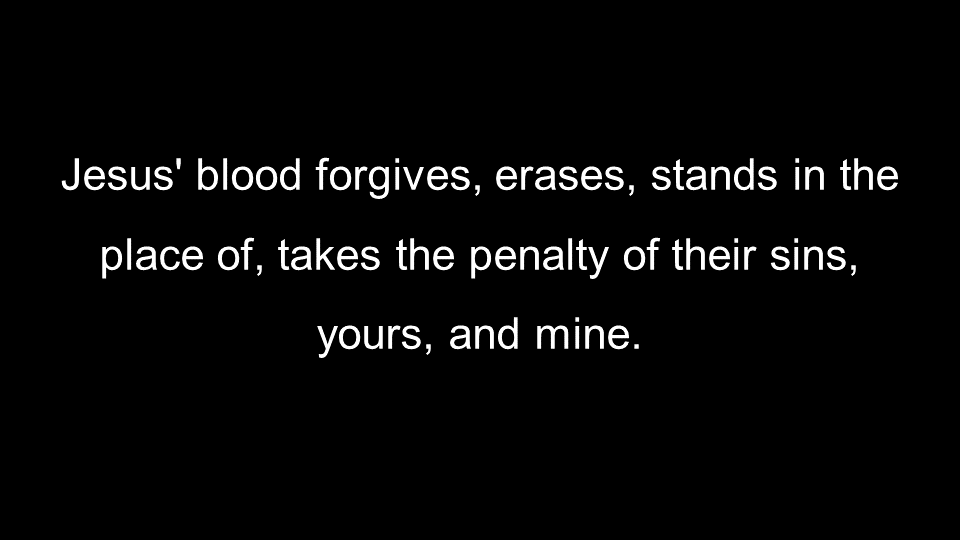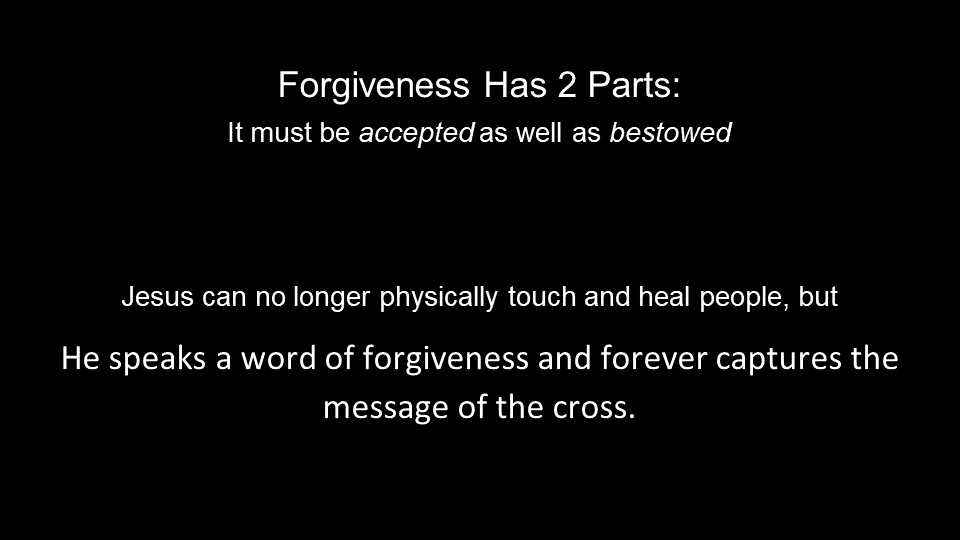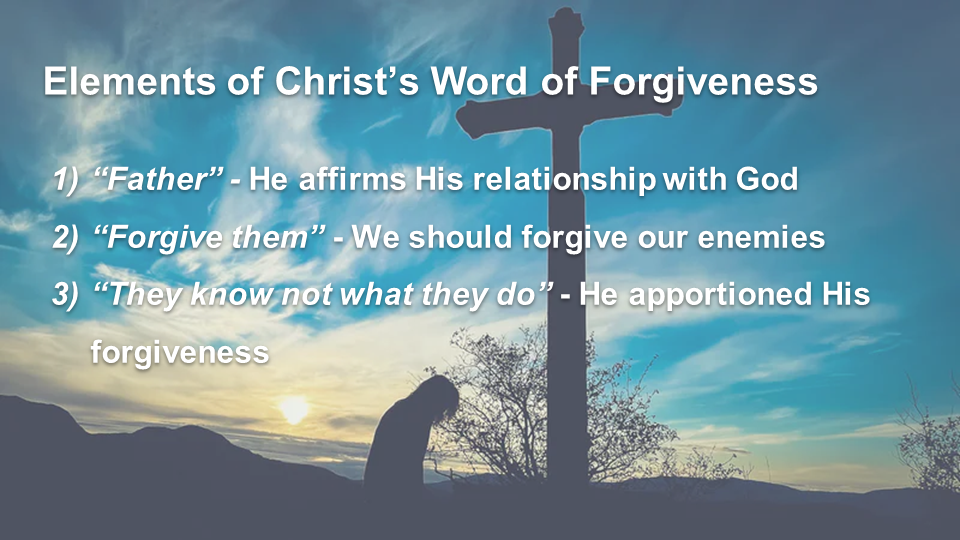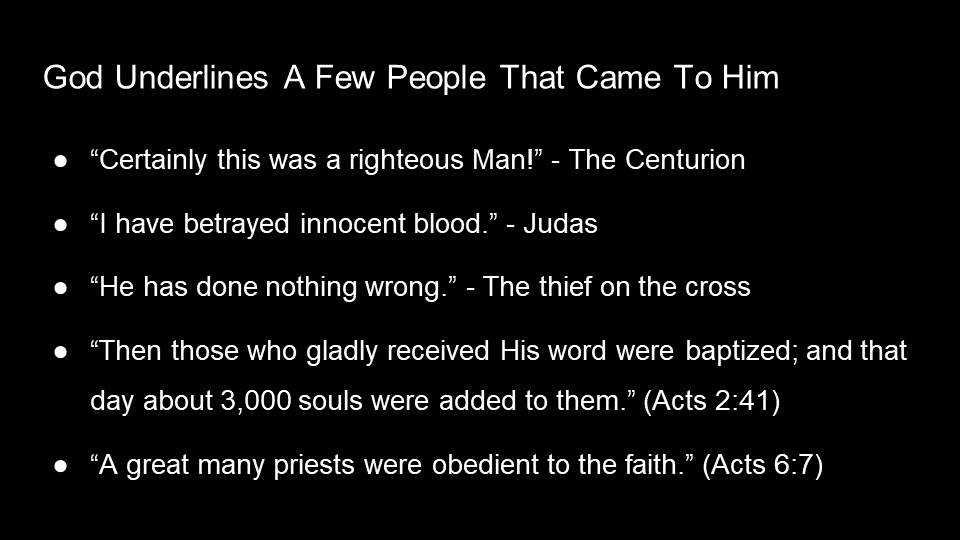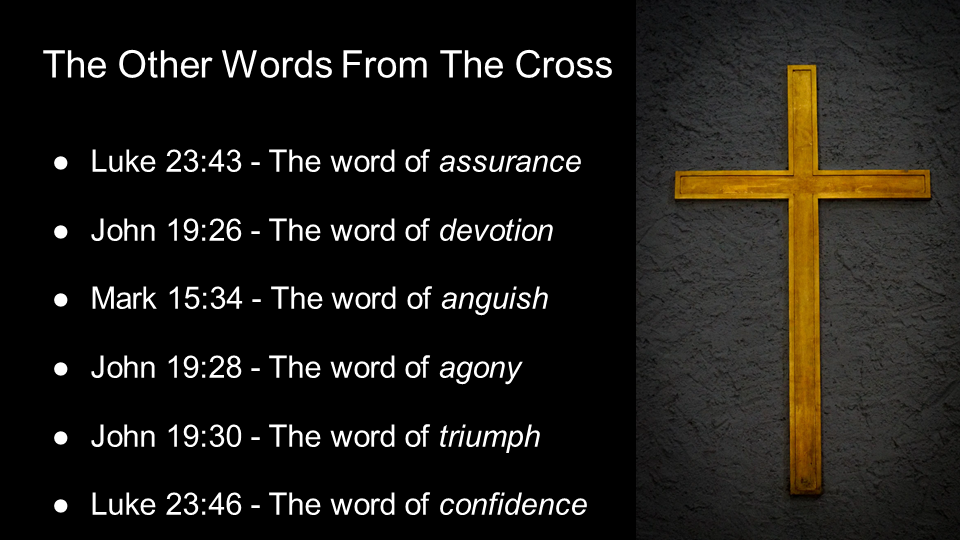If the YouTube video above is not available, here are two other ways to view:
Christ’s Greatest Sermon
FTGC-32b & ZNA-59
990404AM
Transcript
Let’s turn our Bibles to Luke 23. This morning, we’re going to look at the resurrection of Jesus Christ from an incredible angle. That is, the message, the sermon, the greatest sermon I believe that Jesus Christ ever preached is the resurrection sermon He preached while He hung on the cross of wood, the pulpit of Calvary. Jesus preached a sermon from the cross, His seven, as it says in the bulletin, His seven last words. I’m going to underline those for you in your Bible. In fact, if you want to mark them, a lot of people have never noticed that Jesus spoke seven times from the cross. Seven specific, different instances. He broke the silence of the crucifixion and spoke. If you put those seven words together, they side-by-side make the greatest offer that’s ever been made in the universe. It’s the offer of salvation, that Jesus Christ made from the cross of Calvary.
Last words are often long remembered. For those we loved their last words are always a treasure to us. Often last words are a distillation of a person’s entire life. From the pulpit of Calvary, upon a cross of wood, Christ Jesus our Lord spoke seven times. Every time He spoke, it was as if an ocean of redemptive truth was distilled by Jesus Christ into one drop of the glorious Gospel of salvation.
As you turn to Christ’s last words from the hill called Calvary in Luke 23, He speaks from a cross of wood. He speaks from the spot where mankind was murdering its maker. From that moment from the cross, from that ignominious monument to mankind’s hatred, Jesus transformed it into the most powerful pulpit of the world as He declares His seven dying words. Before we read verses 33 and 34 in just a moment, I want you to remember with me how we got where we were, at that moment, at the cross so many years ago.
Do you remember that long dark pathway to the cross? It started in the night watches, in Gethsemane as Jesus prayed for us. Through the dark came the flash of lights as the torches pierced the groanings and the bloody sweat of Christ’s prayers for us. Remember, He prayed for us. Then that cold and wicked kiss of the trader, the hasty arrest. Still in the darkness of night, those illegal and contrived trials that they led Christ through. The arraignment before the High Priest. The long hours of waiting. The tension. Then, Christ’s appearances in the morning before the High Priest and the council. Jesus was dragged to the palace of the Roman Governor. A very strange interview transpired between Jesus and Pilate as they were withdrawn from the rabble into a quiet apartment. Pilate got to be face-to-face with God. He turned his back, even though he knew Jesus was not guilty.
Across the old city Jesus was dragged again, from the house of Pilate to the palace of Herod. What’s amazing is that at last the first and the final meeting that Herod ever got to have with Jesus, that he wanted so badly to meet, occurred. There, the corrupt Herod, the deprived Herod, the Herod who had so often sought to interview Jesus, who had never obtained that interview until the very last hour, Herod who never heard the voice of Jesus because in spite of his curiosity, Jesus never opened his mouth. He wouldn’t even give him a word to listen to. Then became Christ’s rough handling at the hatred of Herod’s brutal soldiers. The journey back to Pilate, and we know the awful scenes. Pilate was striving to rescue Him, but the priests and the people were clamoring for Christ’s blood. Pilate said scourge Him, take Him to the cross. He was crucified.
Then there were six hours. We talked about this with our children. At breakfast you say, it started. Then when it’s supper, it was over. Those six hours, into which the eternity of sins just punishment was compressed. All the sins of those for whom Christ died were compressed, all their eternal punishment, into those six hours. Jesus there in silence endured the cross, never speaking a word, despising the shame in silence, there was no word of complaint. There was no word of crying out in resistance. As Isaiah had said 600 years before, Jesus “was oppressed and He was afflicted, yet he opened not his mouth; He was led as a lamb to the slaughter, and as a sheep that before its shearers is silent, so He opened not His mouth.”
If you remember, Jesus had been acquitted by the highest court of appeal in that part of the world, yet He was subjected to the cruelest punishment. He was seized by the soldiers. He was stripped by them rudely. He was harshly, after being beaten, pushed onto a cross of wood. He was raised aloft to be seen by all, as He was put on an instrument of horror and torture. In the midst of that, finally, there’s a stir. The people that had watched so long, the people who had followed Him so far, all of a sudden, He was going to speak. The one who hadn’t spoken to Herod, the one who never opened His mouth as He was scourged, the one who never cried out as they nailed Him to the cross. He didn’t scream at them as they dropped him Into the hole and the cross thudded. They could see He was opening His mouth; He was going to speak.
What’s amazing for the people back then and historians thought it so curious, that many of the words of the other 30,000 who were crucified in Roman Palestine are written down. Did you know that? They were so awful that they used to write them down. People got so angry, and they were so hateful, and vengeful when they were being crucified that they said some interesting things. The historians used to stand there and write down the last words of these dying, executed criminals of the State. In fact, one historian David Smith said it was usual for those victims of that dreaded doom of the cross to be frenzied by pain. They would shriek, they would beg, they would spit, they would curse the spectators. As Jesus’ lips began to move on the cross that day, does He plead His innocence? Does He condemn them for their ignorance, that they were killing the creator? No. Does He hurl at them the promise of God’s vengeance? No. Does He give them threats? Does He beg them for mercy? No. What He does is, do you know what His first word was? He prayed. In fact, let’s look at His prayer in Luke 23, as we turn there let’s listen to Jesus speaking from the cross as Luke 23 records His first word. It’s nothing new.
Luke 23, I’m going to start in verse 33. “And when they had come to the place called Calvary, there they crucified Him, and the criminals, one on the right hand and the other on the left. Then Jesus said, ‘Father, forgive them, for they do not know what they do.’ And they divided His garments and cast lots. And the people stood looking on. But even the rulers with them sneered, saying, ‘He saved others; let Him save Himself if He’s the Christ, the chosen of God.’ The soldiers also mocked Him, coming and offering Him sour wine, and saying, ‘If you’re the King of the Jews, save Yourself.’ And an inscription also was written over Him in letters of Greek, Latin, and Hebrew: THIS IS THE KING OF THE JEWS. Then one of the criminals who were hanged blasphemed Him, saying, ‘If you are the Christ, save Yourself and us.’ “
Right in the middle of that spectacle, I remind you of verse 34. Jesus looks up and Jesus speaks His first word from the cross. Looking up, praying to God saying, “Father, forgive them.” The first word of Christ from the cross is the word of forgiveness. Jesus preached a sermon in a word when he said the word of forgiveness. Let’s bow before Him in prayer.
Father this morning, your Son, our Savior, spoke seven times. He distilled the ocean of redemption into seven glorious words of salvation. The first word of salvation is the word of forgiveness. I pray that everyone gathered here this morning would understand, would comprehend, and would have experienced the word of forgiveness this morning. Oh Lord thank you, that we can celebrate You Lord Jesus, the resurrection, the life, our hope, our eternal great reward on this, Your day. In Jesus’ name, we pray. Amen.
I want to just underscore this in your mind. Jesus continued the habit of His lifetime, He prayed. His first word from the cross in Luke 23:34 was, “Father, forgive them.” This was the word of forgiveness. Remember He promised He would do that. Do you remember at the Lord’s table? Do you remember when we gathered on Thursday night on Maundy Thursday and celebrated the Lord’s supper I read the verse, “This is My blood of the new covenant, which is shed for many for the remission of sins.” Before He ever went to the cross He said, my purpose in going to the cross is that I offered the remission of sins, the forgiveness of sins. There on the cross He said it. He looked up to His Father in Heaven, God the Son speaking to God the Father said, forgive them, they don’t know what they’re doing.
The word of forgiveness, “Father, forgive them,” was Jesus showing His pity towards sin. His first word from the cross was prophesied. Did you know this is exactly what God said He would do? If you want to keep your finger here, look back at the prophetic record in Isaiah 53. I want to show you that Jesus’ word for word fulfilled every promise that was made about Him. Isaiah, that’s in the Old Testament, one of the big books. Chapter 53, which is the great prophetic picture of the cross, verse 12, the last verse of the chapter. This is what it says, every part of the chapter is about Him. Wounded, verse 5. Bruised, verse 5. Stripes, verse 5. The iniquity of all of us laid on Him, verse 6. All of the different parts of the crucifixion. Look at verse 12 of Isaiah 53, “Therefore I will divide Him a portion with the great, and He shall divide the spoil with the strong, because He poured out His soul unto death, and He was numbered with the transgressors.” There were thieves on both sides of Him. “He bore the sin of many,” that’s what He was doing on the cross. Look at this, what’s the very last thing, the element, the last promise of the cross from the Old Testament? The end of verse 12, “And made intercession for the transgressors.” That’s what He did on the cross. 600 years before He went to the cross, the Spirit of Christ inspired Isaiah to write the word of God. He said that on the cross, Jesus would make intercession for the transgressors.
On your way back to Luke, stop in Matthew 5, you have to go right by it. Turn to Matthew 5. I want to show you that not only was this word of forgiveness prophesied, this word of forgiveness was just what Jesus taught. Jesus taught in the sermon on the mount that we should pray for our enemies. Guess what he does? He does, He practiced what He preached is how we put it in our modern language. Look at Matthew 5 verse 44, Matthew 5 44. “But I say to you, love your enemies.” Jesus is exhorting them. “Bless those who curse you, do good to those who hate you.” Here’s what He’s doing on the cross, “Pray for those who spitefully use you and persecute you.” Isn’t it interesting that Jesus told them that? He says when you’re reviled, and when you’re evil spoken of, and when you’re persecuted; bless, love, and pray for them. He didn’t just say that from the cross, He lived it. This was no small prayer.
Look back at Luke 23 with me, verse 33 and verse 34. This prayer of forgiveness, this word of forgiveness is very interesting. In fact, a man many years ago by the name of Rotherham was so concerned that Christians didn’t know Greek and Hebrew that he wrote an edition of the Bible that’s so interesting, by an ingenious means of lines he put the tenses of the verbs. He would put brackets around words, and he underlined them this way. It’s actually a whole, it’s a real thick Bible, it’s called Rotherham’s, his edition. What he does is he shows the tenses, he shows the action going on in the Greek language. What’s amazing is that this tense, look what it says in verse 34, he said, “Father, forgive them.” To us in English, you know what that means? That Jesus was hanging there like this, and He opened his mouth and He said, “Father, forgive them.” Like He got one breath out and that was it. That’s what it looks like, doesn’t it? You know what’s amazing? Luke records, under the inspiring power of the Holy Spirit, he records that He kept on repeatedly saying. He didn’t say it once. He didn’t say it twice. He said it over, and over, and over again. You know what that means? It wasn’t like, oh, got to forgive them… “Father, forgive them,” I got that out. No. It was the passion of His heart. The very first word from the cross that Jesus spoke and the most critical element of the message of resurrection Sunday is that “God so loved the world that He gave His only begotten Son, that whoever believes in Him should not perish but have everlasting life.” How? Because God forgets about their sin? No, because Jesus’ blood forgives, erases, stands in the place of, takes the penalty of their sins, yours, and mine.
The first word from the cross as the word of forgiveness, Jesus kept saying, “Father, forgive them.” Forgiveness has two parts. It must be accepted as well as bestowed. Jesus there on the cross made forgiveness available to all. This offer was not availed except by a few, so few. Jesus was praying for His enemies, for sinful humanity, not for Himself but for others. To the end of His life, at the hour of His death, His lifelong communion with God continued. Do you know what I see as Jesus hangs there, as He’s praying? No longer can He touch the sick and the infirm to heal them, because He’s nailed to the cross. No longer can He open sightless eyes to see His truth, because He’s dying. No longer can He multiply loaves and fish to picture the eternal food, because he’s alone and can’t do those things anymore. What does he do? He speaks a word of forgiveness and forever captures the message of the cross.
If you take your hymnbooks books for just a second, we’re not going to sing, so don’t worry. I want you to read a poem, it struck the heart of Charles Wesley. Number 199. I want you to read some words of it with me. If you think about this word forgiveness, it’s so well applied by the Wesley brothers. Charles Wesley and John, his brother, wrote many, many poems. This is one of their more beautiful poems. I want you to read with me a couple of stanzas of it. The first and the fourth stanzas capture this moment on the cross. With your hymnbooks, let’s just read, don’t sing. Read with me stanza one, and then we’ll read four. “Arise, my soul, arise; shake off thy guilty fears; the bleeding sacrifice in my behalf appears: before the throne my Surety stands, before the throne my Surety stands, my name is written on His hands.” Stanza four, “The Father hears Him pray, His dear anointed One; He cannot turn away, the presence of His Son; His Spirit answers to the blood, His Spirit answers to the blood, and tells me I am born of God.” That was Wesley trying to interpret this incredible moment.
The word of forgiveness as Jesus, as He was offering Himself to God. As He, and look back at verse 33, as He was looking out to those, He was looking out to the religious leaders that were gathered, mocking Him. He was looking at the callous soldiers. He was looking at one thief on the right and one thief on the left. If you want to know how bad it gets, the criminals that were likewise being executed, didn’t want to be associated with the fellow, Jesus. Did you notice that’s one of the most striking things about the cross, that the religious leaders hated Him? The soldiers were doing their job. The rabble was crying. Those two guys up there joined in all that instead of saying, hey, don’t pick on Him, we’re dying, leave us alone. They joined in. All of them together were screaming with the crowd and hurling their insults at Christ.
Let me just show you four elements of Christ’s word of forgiveness. First, notice what He says in verse 34. You know what the first thing Christ affirms from the cross was? His relationship to God. What Jesus did say, nothing on Earth can rob me of my son-ship, nothing on Earth can take it from the blessedness that Jesus knew of His fellowship with the Father. You know what that tells us this morning? Nothing can take away our relationship with God either. “Neither death nor life, nor angels, nor principalities, nor powers, nor things present, nor things to come, nor height, nor depth, nor any other created thing, shall be able to separate us from the love of God.” Jesus says, I want to remind you, I affirmed my relationship with you. Crush my body, torture me all you want, my faith is secure. You know what, the Bible says? We’re “more than conquerors” through Christ. Nothing can separate us from His love. No circumstances could change His relationship with His Father. We, like Jesus, should know that the word of forgiveness He preached from the cross is a word that lets us enter into relationship with God that nothing can ever take away from us. Once he buys us, once He has purchased us and purchased our salvation, there is nothing we can do to make Him love us anymore or any less. We get off the treadmill of trying to impress God. What we do is, we start growing in our loving relationship to Him as our perfect Father who will never leave us, never forsake us, never disappoint us. He will never change; He doesn’t vary like our Earthly fathers often do. He’s the perfect Father. Jesus affirmed that relationship.
Secondly, notice what it says. Father, that’s the relationship, but He says, forgive. This was Christ asking and Isaiah prophesied 600 years before that He would make intercession. Jesus taught just three years before in the sermon on the mount that we should love our enemies. The tense of this Greek verb is a repeated request. Jesus kept saying, “Father, forgive them,” “Father, forgive them,” over and over, the word of forgiveness. You know what? Jesus did limit the forgiveness. Did you notice that? One person put, apportioned it. You know, how they apportion politically, the monies that the government has, they have it apportioned? Look what He says, “they know not what they do.” Jesus limited His forgiveness from the cross. Why? Satan knew what he was doing. Satan planned this whole thing. He entered Judas. Satan was trying to get Jesus the whole way from the murder of the innocence in Herod’s killing of the babies of Bethlehem, all the way through the storms that Satan kept throwing up, trying to take Christ drown. All the way to the crowds that tried to stone Him. Satan knew what he was doing. He didn’t forgive Satan. You know what else is interesting? Judas knew what he was doing. Judas wanted to snuff out that light. Pilate coldly calculated what was best for his political career, and he wrongfully made a choice. It was a bad choice. The Sanhedrin, all but two of them… praise the Lord, two members, Joseph and Nicodemus, they weren’t with the rest. The Sanhedrin, wanting to put out the light of the world. To the rest, to those bystanders that were unaware of the enormity of their crimes, Jesus offers a word of forgiveness. This made it available, but so few availed themselves of it. Some did.
I see the answer to this prayer, and I think that we can see it this morning. Look at verse 47. Here’s one answer to Christ’s prayer. Here’s Jesus, as He’s saying “Father, forgive them,” He is making it available, but they have to accept that, they have to receive it. God underlined a few people that did take Him up on His offer. Verse 47 of the same chapter, when the centurion saw what had happened, here’s the first answer to Christ’s prayer. He glorified God and said, “Certainly this was a righteous Man!” What’s interesting, God spotless the spotless righteousness of Christ. Have you ever thought about that? Have you ever thought about Pilate who says, I find nothing wrong with this man? Pilate’s wife says, “Have nothing to do with this just man.” Judas, before he killed himself, said I have betrayed what? “Innocent blood.” In just a moment we’re going to see the thief on the cross, the one that came to Christ. Do you know what he said? He says, we deserve this, He “has done nothing wrong.” Look at the Centurion who standing there watching the whole thing, verse 47. He says, “This was a righteous man.” God underscores all the way throughout the story of the spotlessness of Christ. The centurion, seeing what happened, was the first of the three beautiful portraits of forgiving grace that the Lord records.
Luke records in the book of Acts, if you want to flip over to chapter 2, verse 41, remember Luke wrote both Luke and Acts; look what he says in 2:41 here. Here’s another answer to Christ’s prayer. It says in verse 41. “Then those who gladly received His word were baptized; and that day about 3,000 souls were added to them.” Acts 2:41, the book of Acts, 2nd chapter, 41st verse. Do you think it was the eloquence of Peter’s sermon that got all those people to come to Christ? I think it was the answer to His prayer from the cross. I think a large part of the crowd that were standing there witnessing Jesus on the cross, and it was going through their hearts, they heard His prayer “Father, forgive them.” He said it over and over again. If anybody was interested in the spectacle, they moved up to see what this man was saying from the cross. They kept hearing Him say, “Father, forgive them,” “Father, forgive them, for they do not know what they do.”
There’s one more group I think is interesting. Not only the Centurion, Luke 23 and the 3,000 at Pentecost (Acts 2:41), but the 6th chapter of Acts. Another group that was at the cross got saved. Acts 6 in verse 7 it says, “The word of God spread, and the number of disciples multiplied greatly in Jerusalem,” and look at this, “and a great many of the priests were obedient to the faith.” These priests were the ones that were around when all the lepers came to offer their offerings for cleansing. These priests were around when people went screaming, and yelling, and jumping through the temple because they were healed. These priests had come to witness the spectacle on the cross. Those priests had handled the pictures of Jesus’ death through the sacrificial system of the old covenant, and had handled the blood, and who had handled the lambs looked up. They saw the spotless, sinless, righteous, never did anything wrong Lamb of God saying the word of forgiveness.
Christ spoke His first word from the cross. It was a word of forgiveness and God answered beautifully by saving the centurion, by saving the 3,000 at Pentecost, by saving a great company of priests, and He still is answering today by forgiving sinners like you and me this morning.
I said, Christ spoke seven times from the cross. I want to show you the other ones. If you look back in chapter 23, the second word from the cross is verse 43. I just want you to mark these and I’ll tell you what they are. You can explore them on your own because each one is, as I said, an ocean of truth. In Luke 23:33-34, we saw the word of forgiveness. In verse 43, we see the word of assurance. That’s the second word from the cross. It says in verse 43, “And Jesus said to him,” this is the other thief, “Assuredly, I say to you, today…” not after you go for a while and get burned off in purgatory, not after you wander around in the netherworld for a while and after your soul sleeps. “Today,” you penitent, sinful thief, repentant and turning to Me, “today you’ll be with Me in Paradise.” That’s the word of assurance.
What I see is, the King of Glory looking at a seeking believer and showing His power toward him. Jesus comforted the penitent. It’s amazing how clearly this guy could see. Notice what happens, it says both of them were reviling Him, if you look at all the Gospel messages, but in verse 40 this fella changes. Look back at verse 40, “The other, answering, rebuked him,” the other thief. He yells across Jesus in the middle. He yells to the other side to that other thief when he says, “Do you not even fear God?” Do you know what he is saying? I do, I do, or he began to. He didn’t formerly, he was reviling Christ, but he says, “Do you not even fear God,” verse 40, “seeing you’re under the same condemnation? And we indeed justly,” verse 41. Do you know what that’s called? He admitted he was a what? Sinner. The first step of salvation. He looked at Jesus and he said, I am a sinner.
Someone told me, that’s going through our evangelism explosion program, they said, I’m amazed the one thing that’s hardest for people in Tulsa to admit is that they are sinners. Most of us say, I don’t do things perfectly well, but I’m not a sinner. God says we are. This thief in verse 41 says, “we indeed justly, for we receive the due reward of our deeds; but…” then he looked at Jesus, he said, “this Man has done nothing wrong.” You know what he recognized? He believed that Jesus was the perfect, spotless Lamb of God. That’s the second element of salvation. Admit that we’re a sinner and believe that Jesus is the perfect sacrifice for our lostness.
It doesn’t stop, look at verse 42. If he would have stopped in verse 41, he’d be like a multitude of people that are alive on this planet today that are going to miss Heaven by 18 inches. They know all about God, they go to church on Easter, they know the verses and the songs, they read the Bible, but they have never confessed. Look at his confession, verse 42. “Then he said to Jesus, ‘Lord, remember me when You come into Your kingdom.’ “ What did he say? He says, you’re a king, this is not the end, You are going beyond this cross. You have a kingdom, You are a king, You are spotless, You are sinless, You are Lord, and I’m a sinner. Will you take me with You? What a wonderful prayer of salvation. You notice he doesn’t pray what we all pray. I was listening, like I do every Sunday Morning, I always enjoy listening to Billy Graham on Sunday morning. Sometimes we’ve listened to that so much we think we have to say exactly what he says on the radio. People really fret with that. They go, can I pray it again? I’m not sure I prayed the right thing. It’s not pray the right thing, it’s talk to the right person. The thief on the cross, hanging there said, I admit I’m a sinner. I agree I should be nailed here; He shouldn’t be. He took my place. He went from the mind to the will. He looked at Jesus and he said, “remember me when You come into Your kingdom.” I like what John Calvin many years ago said, when he was preaching on Easter Sunday. 400 and some years ago he said this, how clearly this thief could see. In death he saw life in Jesus. In his personal ruin he saw majesty in Jesus. In the hour of his shame, he saw glory in Jesus. In the moment of his utter defeat, he saw victory in Jesus. In the moment of the dreaded result of his slavery to sin he saw the royalty of Jesus coming to save him.
What’s the word of assurance? Verse 43. The second word from the cross, “Assuredly, I say to you, today you’ll be with Me in Paradise.” There are religions that teach you can’t know you’re going to Heaven. There are religions that say, you hope you get there but you’re going to have to go through the fire for a while. The Lord smites that error dead with one word from the cross.
Let me give you the rest. Look to John 19, the next book, the third word from the cross. I’m just going to read the verses to you, and you can mark them in your Bible. At communions in the future we’re going to cover these, but I want you to have them marked so they’re familiar to you. John 19:26 says. “When Jesus therefore saw His mother, and the disciple whom He loved standing by, He said to His mother, ‘Woman, behold your son!’ Then He said to the disciple, ‘Behold your mother!’ And from that hour that disciple took her to his own home.” This is the word of devotion. This is the word that Jesus will take care and provide for those He loves. Those whom He forgives He gives the assurance of eternal life. He devotes Himself to their care. That’s Jesus’ ministry.
Now, something else that is smashed by this. You notice that he doesn’t give John into Mary’s care, He gives Mary into John’s care. Mary is not to be worshiped, not to be adored, not to be thought as some intercessor. She needed care and she needed a savior. Christ gives His loving word of devotion and calls her not mother, not mother of God and all the other things nowadays, but woman; I entrust your care to the apostle whom I love, John.
Back to Mark 15. Here’s another one, this one is the fourth word from the cross. Mark 15, verse 34. This is the word of anguish. This is probably the most difficult part of the cross to understand as Jesus expresses His spiritual anguish at bearing sin. Also, how the person of the Son could be separated from the person of the Father, how one essence could be divided, and how Jesus could suffer as God turned His back on Him. Not the turning of hostility, but the turning of holiness as God the Father couldn’t look at sin. As Jesus bore in His own body, the sin of all of the totality of the mass of sinful humanity, as He bore that and became sin, God turned His back. What did Jesus respond with? The word of anguish. That’s the fourth word. My God; ” ‘Eloi, Eloi, lama sabachthani?’ Which is translated, ‘My God, My God, why have You forsaken Me?’ “ The word of forgiveness, the word of assurance, the word of devotion, the word of anguish.
Back in John’s Gospel is the fifth word, in the 19th chapter. By the way, these are in order chronologically, when they happen. What you have to do is, you have to take all four Gospels and put them into a harmony. When you put all of them into a harmony, you can see exactly the sequence of the words that Jesus said. The fifth time He spoke from the cross is in John 19:28. This was the shortest, it’s just one little, tiny word. He said dipsō. That means “I thirst” in John 19:28. “After this, Jesus, knowing that all things were now accomplished, that the Scripture might be fulfilled said, ‘I thirst.’ “ This is the word of agony. Isn’t it amazing that He who said that, He is the water of life and all who come to Him will never thirst; He who said, that you will be refreshed by His presence? He who is a creator that spoke, the person of God who spoke all the universe into being, that the creator, that the giver of life and of refreshment, thirsted. This is the word of utter agony, as Jesus Christ painfully suffered in our place and endured the horrors of the cross for us.
Just a few more look, at verse 30 of the same chapter. This is a six time Jesus spoke. He spoke first the word of forgiveness, then secondly the word of assurance, third of devotion, fourth of anguish, fifth of agony. Number six is the word of triumph. It says in verse 30, “So when Jesus had received the sour wine,” by the way, the first time they offered Him something to drink it had a narcotic in it and he says, no, I am not going to miss any of the pain that I’m suffering for sin. The second time they offered Him a drink, it was just sour wine. It was just a little something so that He could continue, be able to speak, able to be there on the cross, able to communicate. He says, I’ll take a drink. It’s interesting, He wouldn’t miss any of the pain, but He didn’t take any extra that wasn’t necessary. Some people don’t want any pain and others, they are so desiring of pain that they go far beyond God. God’s beautiful balance here, Jesus says I’m not going to miss any of the pain, I need to suffer for sin, but I’m thirsty, I need to speak, and I won’t be able to speak so I’m going to take a little drink of that sour wine; and He did. After He had received the sour wine, he was able to get His mouth refreshed enough to speak, it says He cried out one word again in the Aramaic language. That one word is the beautiful word, tetelestai, it is finished. This is the word of triumph as He declares His triumph over sin, as He finished, spiritually, all the work of redemption.
Let’s conclude back where we began in Luke 23. I want to show you His last word from the cross. Luke records that last word in Luke 23 in verse 46. This is what Jesus said, after He spoke a word of forgiveness so that we can know we are forgiven, after He spoke a word of assurance so that we can know we are Heaven bound, after He spoke that word of devotion so we can know we are not going to go through life alone, after He spoke the word of anguish so we know that He feels our pains, after He spoke the word of agony so that we know He will never leave us, and after He spoke the word of triumph so we know that our salvation is secured and finished. He says in verse 46, the word of confidence. Notice what He says in verse 46. “And when Jesus had cried out with a loud voice,” He prayed again. He looks up and He says, “Father, into thy hands I commit My spirit.” You know what that is? That’s the word of confidence. As our beloved brother standing against a fence post on Thursday at 2:00 PM, Ken, breathed his last, his spirit went into the presence of the Lord. Isn’t that a confident hope we can have? Whether we lay with a respirator in a hospital bed, whether we’re pinned in the wreckage of a car, whether we slowly waste away with cancer, or whether He comes and we go into His presence. In the moment, in the twinkling of an eye, we can have the confidence. Did you know these words, “into Your hands I commit My spirit,” are the words, that it says in history, that Augustan said on his deathbed as he breathed his last? St Augustine said, “into thy hands I commit my spirit.” As they were taking Polycarp to the flames and as he was burning, his last words were, “into thy hands I commit my spirit.” Stephen, as he was martyred, as they were throwing stones at him and his life was being crushed out, in Acts chapter 7 he says, “into thy hands I commit my spirit.” Martin Luther after his long and illustrious life, as he lay there dying, he was able to pull together enough strength to look at his family and he says his last words, “into thy hands O God, I commit my spirit.”
I wonder this morning. Do you have that confidence? Do you have the confidence that you’re forgiven? Do you have the confidence that you have an assurance of salvation? Do you have the confidence that Christ is devoted to take you to the end, that He has triumphed over? Jesus preached the greatest sermon from a cross of wood, a pulpit on a hill called Calvary. His resurrection sealed that sermon, but have you listened to it? Let’s bow before Him this morning.
Dear Father, I thank you for this morning where we can gather to worship the greatest event of all time, the sacrifice of Your Son in our place and His triumphant resurrection from the dead. This morning, I ask you in Jesus’ name, that you would clear away all the distractions from the hearts of each of those who are listening. For any who have not yet said yes to Jesus, that like the thief on the cross they would, right where they’re sitting, in their heart of hearts and the privacy of their will say yes, I am the sinner. I am guilty in your sight, O God. I’m a guilty, condemned sinner. One or many, it doesn’t matter. Sin is sin. Then Father, that Your Spirit would quicken them to believe that Jesus did nothing wrong. Rather, He came as our substitute, as my substitute, as your substitute. Then Lord, that they would take the willful step of going to Your feet, confessing, and crying out, O forgive my sins and may I have eternal life with You. That would be the greatest decision they could ever make in this life. It will assure them of the life to come. I pray this morning, that you will draw to Yourself those who you will have, that You would bring them to salvation. For us who know You, O Christ, may we go forgiven, confidently, triumphantly, assured that into your hands our spirit will go. Until that time, we are going to live in the power of God as Your ambassadors. Thank you for resurrection Sunday. Thank you for the hope of the Gospel. Take us to stay, fill us with your Spirit, loosen our lips, help us to tell people all day long and this week why we rejoice, because You rose and because we have eternal life, Your word of forgiveness, Your word of assurance, Your word of triumph, Your word of confidence. In the precious name of Jesus we thank you. All God’s people said, Amen.
Slides
Check Out All The Sermons In The Series
You can find all the sermons and short clips from this series, 52 Greatest Chapters In The Bible here
Looking To Study The Bible Like Dr. Barnett?
Dr. Barnett has curated an Amazon page with a large collection of resources he uses in his study of God’s Word. You can check it out here.



